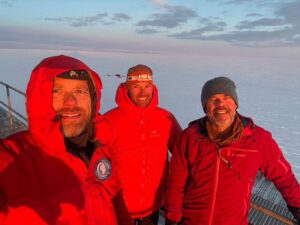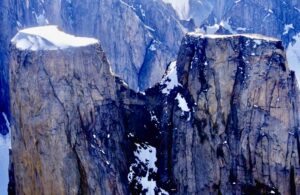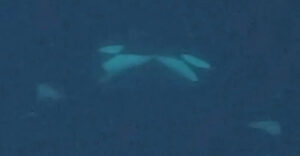A passion for the natural world drives many of our adventures. And when we’re not outside, we love delving into the discoveries about the places where we live and travel. Here are some of the best natural history links we’ve found this week.
Watch the migration of 55,000 beluga whales: From July 15, the research vessel Delphi will live broadcast beluga whales making their annual migration into Hudson Bay and the Churchill estuary. They come here every summer when the sea ice melts.
Over winter, the great bay freezes, and the whales move north into the semi-open Arctic Ocean. The Churchill River estuary, which empties into Hudson Bay, provides food and also warmer, low-salt water for young calves that have not developed all their blubber yet. Though many populations of beluga whales are endangered, the group that undertakes this migration is encouragingly healthy.

A traditional Makah whale hunter.
Indigenous rights vs mammal protection
U.S. native group wants to restart whale hunting: For 17 years, laws protecting endangered species have stopped the Makah, a tribal nation, from whaling off their Washington State homeland.
The whales they want to hunt have now recovered their numbers. In early July, the U.S. government seemed inclined to allow them to resume their hunt. The proposed plan would allow a quota of 12 whales over six years.
The Makah negotiated their right to keep whaling in their 1855 treaty, but this was overruled by the Marine Mammal Protection Act. Both government and public are now torn over conserving whales versus respecting indigenous rights. The people themselves voluntarily stopped whaling 20 years before an official ban.
It has not been easy. “When you break those connections that define who you are, people struggle,” said Makah Chairman Timothy J. Greene. “The training and spiritual preparation we go through [to prepare for a hunt] helps make our community whole and really become who we are.”

Photo: Shutterstock
How to lower stress in orphaned elephants
Social support helps orphaned elephants’ cope: Researchers have analyzed the level of stress hormones in orphaned elephants to understand how the loss of their parents impacts their health. Young, orphaned elephants in a group among other elephants around the same age had noticeably lower levels of stress. This may be because of their friends’ social support.
The study began because the number of orphaned elephants rose significantly between 2009 and 2013. Many orphaned calves were bullied by the other elephants in their group.
Human urine could be key to saving seagrass: Researchers recently made a strange discovery: Crystalized human urine helps seagrass meadows recover. Replanting seagrass is common to help restore the ecosystem, but the plant grows slowly. Fertilizers can speed up the process, but it also causes algae in the water to grow. The algae block out the sunlight and deprive the seagrass of oxygen.
But struvite, a compound formed in human urine, helps solve the problem. The crystals dissolve slower than the fertilizers. Seagrass grown with struvite had five times more shoots than those fertilized with conventional growth agents.
The secret of the fire coral’s success
Fire coral thrives as others vanish: Scuba divers dread fire coral. A mere touch on the skin can lead to agonizing pain. Yet this unpopular coral may help save Caribbean reefs. As other corals die from hurricanes, disease, and climate change, fire coral can endure these stresses and is thriving.
Fire coral grows in two ways: as sheets flat coating other flat surfaces or as trees. Its ability to do this has allowed it to flourish. “In a world with frequent storms and stiff competition for space on the bottom, fire corals are poised to inherit the shallow reefs,” said marine biologist Peter Edmunds.






